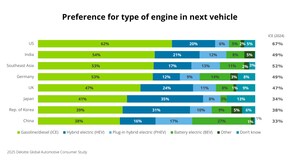OAKLAND, Calif., May 10, 2017 /PRNewswire/ -- Deloitte today announced new research that identifies keys to driving a highly diverse and inclusive corporate culture, which in turn drives better business outcomes. Summarized in a WhatWorks® brief, the findings appear in "High-Impact Diversity and Inclusion: Maturity Model and Top Findings," research from Bersin by Deloitte, Deloitte Consulting LLP. Researchers will present this study during Bersin by Deloitte's IMPACT 2017 conference, May 22-25 at the Diplomat Resort & Spa in Hollywood, Florida.
Based on a survey of 245 global organizations and more than 70 client interviews, the new four-level maturity model describes the evolution of diversity and inclusion and what companies should do to move from a compliance emphasis to a strategic focus in order to create a truly inclusive culture. The research reveals that organizations with inclusive cultures are six times more likely to be innovative, six times more likely to anticipate change and respond effectively, and twice as likely to meet or exceed financial targets. Despite the demonstrated benefits of embracing an inclusive culture, the research also indicates that only 12 percent of organizations around the world have reached full maturity.
"Diversity and inclusion has been a compliance function driven by human resources for too long," said Josh Bersin, principal and founder, Bersin by Deloitte, Deloitte Consulting LLP. "Our new diversity and inclusion maturity model shows that the most effective way to achieve significant gains is through leadership ownership, strategic measurement, and a culture of accountability for inclusion that is driven from top to bottom."
The research demonstrates that inclusive organizations outperform their peers, and these organizations embed these strategies in almost all management decisions. The strong performance of such organizations may be among the reasons the "2017 Deloitte Global Human Capital Trends" research shows 78 percent of respondents believe diversity and inclusion is a competitive advantage.
"Our research demonstrates that inclusive talent practices drive measurable and predictable business outcomes," said Stacia Sherman Garr, vice president, talent and workforce research leader, Bersin by Deloitte, Deloitte Consulting LLP. "After two years of study, we conclude that these business outcomes are possible for all companies – but only with a change in focus. The research shows that CEOs and business leaders should own the strategy, and the entire organization should embed and use inclusive talent practices."
The research also shows that in organizations with inclusive cultures, people tend to feel that they can be themselves, share problems, make mistakes, innovate, and drive change. In addition, the new research offers a roadmap for organizations that want to create inclusive cultures. Specifically, it reveals six principles that are key to creating a more inclusive organization:
- Treat the evolution of diversity and inclusion as business-critical, not compliance-necessary. Organizations that approach diversity and inclusion as a business priority are more likely to report superior business outcomes.
- Move beyond diversity to inclusion and diversity. Organizations that focus on the value of inclusion, in addition to diversity, typically enjoy superior performance as compared with peer organizations that do not.
- Prioritize inclusive leadership. Leaders who demonstrate behaviors such as courage, curiosity, and cultural intelligence tend to enable cultures that encourage inclusiveness.
- Reinforce an inclusive culture by integrating both demographic diversity and diversity of thought into all talent management practices. It is especially important to do this at moments that affect the talent pipeline, such as decisions that impact talent acquisition, promotions, succession management and leadership development.
- Provide diversity and inclusion resources that empower individuals to take action. Inclusive organizations are more likely to offer resources that enable individuals to bring their authentic selves to work, manage unconscious bias effectively, and leverage the support of mentors and sponsors to help them navigate their organizations. Further, more mature organizations offer these resources broadly – not just for diverse populations.
- Drive accountability, not metrics tracking. Organizations should create accountability by sharing strategic measurements about diversity and inclusion-related activities and their impact, and have senior leaders discuss achievement on an ongoing basis. One aspect of this might be to tie compensation to diversity and inclusion outcomes, a practice employed currently by only 6 percent of companies surveyed.
To begin to achieve maturity, organizations should talk about diversity and inclusion as a critical component of the organization's business strategy through both formal communications and reporting relationships, according to the research.
"Organizations can also build an awareness of bias into critical talent activities, to remind all employees of the importance of managing bias at moments that will have long-term impacts on the talent pipeline," Garr said. "Critically, leaders should be held accountable for improving diversity and inclusion outcomes just as they are accountable for other business metrics."
To learn more, register to hear Stacia Sherman Garr describe the top findings of this research in two upcoming online webinars:
- High-Impact Diversity and Inclusion: The New Maturity Model, 2 p.m. EDT/19:00 British Summer Time, May 18, 2017. Candace Atamanik, talent and workforce research leader, Bersin by Deloitte, Deloitte Consulting LLP, will co-present this webinar.
- Inclusive Cultures and HR Digitalization: HR technology's Impact on Workplace Equity and Diversity, 2 p.m. EDT/19:00 British Summer Time, June 29, 2017.
Bersin by Deloitte delivers research-based people strategies designed to help leaders and their organizations in their efforts to deliver exceptional business performance. A Bersin by Deloitte membership gives HR professionals the information and tools they need to design and implement leading practice solutions, benchmark against others, develop their staff, and select and implement systems. Those interested in learning more about Bersin by Deloitte or its WhatWorks® membership can email [email protected] or call +1 510 241 4400.
About Deloitte
Deloitte provides industry-leading audit, consulting, tax and advisory services to many of the world's most admired brands, including 80 percent of the Fortune 500 and more than 6,000 private and middle market companies. Our people work across more than 20 industry sectors to deliver measurable and lasting results that help reinforce public trust in our capital markets, inspire clients to make their most challenging business decisions with confidence, and help lead the way toward a stronger economy and a healthy society.
Deloitte refers to one or more of Deloitte Touche Tohmatsu Limited, a UK private company limited by guarantee ("DTTL"), its network of member firms, and their related entities. DTTL and each of its member firms are legally separate and independent entities. DTTL (also referred to as "Deloitte Global") does not provide services to clients. In the United States, Deloitte refers to one or more of the US member firms of DTTL, their related entities that operate using the "Deloitte" name in the United States and their respective affiliates. Certain services may not be available to attest clients under the rules and regulations of public accounting. Please see www.deloitte.com/about to learn more about our global network of member firms.
SOURCE Deloitte
Related Links
WANT YOUR COMPANY'S NEWS FEATURED ON PRNEWSWIRE.COM?
Newsrooms &
Influencers
Digital Media
Outlets
Journalists
Opted In






Share this article